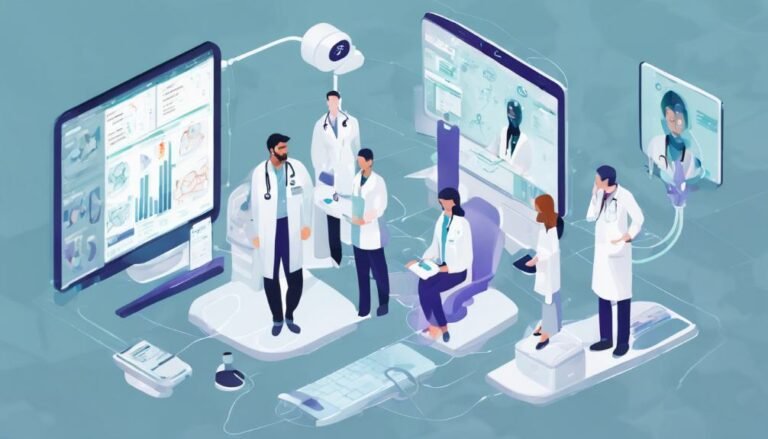AI in Precision Medicine
In the domain of precision medicine, AI serves as a powerful tool, analyzing vast amounts of patient data, tailoring treatments to genetic profiles, and predicting disease progression. But what implications does this hold for healthcare providers and patients alike? How does AI navigate the complexities of individualized care while ensuring ethical considerations are addressed? Explore the intersection of artificial intelligence and precision medicine to uncover the transformative impact on healthcare practices and patient outcomes.
Key Takeaways
- AI tailors treatments based on genetic profiles.
- AI assists in clinical decision-making.
- Machine learning optimizes treatment strategies.
- AI predicts disease progression and drug combinations.
- AI-driven tools streamline diagnostics.
Role of AI in Precision Medicine
AI plays a pivotal role in revolutionizing precision medicine by leveraging advanced AI algorithms to analyze vast amounts of patient data and tailor treatments to individual genetic profiles. These AI algorithms are designed to sift through complex datasets, identifying patterns and insights that can inform clinical decision making.
By processing genetic information, medical histories, and other relevant data points, AI can help healthcare professionals make more accurate and personalized treatment decisions.
In clinical decision making, AI algorithms can assist in predicting disease progression, determining best drug combinations, and even identifying potential side effects based on individual genetic predispositions. This level of tailored treatment planning has the potential to greatly improve patient outcomes and reduce the risk of adverse reactions to medications.
Additionally, AI-driven tools can streamline the diagnostic process, helping healthcare providers make quicker and more informed decisions that are grounded in data-driven insights.
Ultimately, the integration of AI into precision medicine holds great promise for enhancing patient care and advancing medical research.
Advantages of AI Technologies
By harnessing advanced algorithms, healthcare professionals can capitalize on the advantages of AI technologies in precision medicine to optimize treatment strategies based on individual genetic profiles.
Machine learning, a subset of artificial intelligence, enables systems to learn from data and make predictions or decisions without being explicitly programmed. This technology plays an essential role in analyzing vast amounts of medical data to identify patterns and insights that can guide personalized treatment approaches.
One significant advantage of AI technologies in precision medicine is the ability to leverage big data. With the exponential growth of healthcare data, AI can efficiently process and interpret this information to uncover correlations that may not be apparent to human researchers.
Personalized Treatment Plans
Utilizing patient-specific data and medical insights, personalized treatment plans can be meticulously crafted to address individual health needs with precision.
Genetic testing plays an essential role in tailoring treatments to a patient's unique genetic makeup. By analyzing genetic information, healthcare providers can identify specific genetic mutations or variations that may influence treatment outcomes. This allows for the development of targeted therapies, which are designed to effectively combat diseases at a molecular level.
In personalized treatment plans, the integration of genetic testing results with other clinical data helps determine the most suitable course of action for each patient. By considering factors such as genetic predispositions, medication responses, and disease progression patterns, healthcare teams can optimize treatment strategies to maximize efficacy and minimize adverse effects.
Through the implementation of targeted therapies, patients can receive treatments that are specifically tailored to their genetic profiles, ultimately leading to more personalized and effective healthcare interventions.
Predictive Analytics in Healthcare
You can harness the power of predictive analytics in healthcare to drive data-driven patient outcomes.
By using advanced algorithms and machine learning techniques, healthcare providers can tailor personalized treatment plans for individuals based on their unique medical history and genetic makeup.
This approach not only enables early disease detection but also empowers proactive interventions that can greatly enhance patient outcomes.
Data-Driven Patient Outcomes
In precision medicine, data-driven patient outcomes play an essential role in leveraging predictive analytics to optimize healthcare interventions and personalize treatment plans. Data integration is pivotal for combining information from various sources like electronic health records, genetic data, and patient-reported outcomes.
Predictive modeling utilizes this integrated data to forecast patient outcomes, aiding healthcare providers in making informed decisions.
Machine learning algorithms analyze vast datasets to identify patterns and predict potential health outcomes for individual patients. By leveraging these predictive models, clinicians can tailor treatment plans based on a patient's unique characteristics and predicted responses to different interventions.
Clinical trials benefit from predictive analytics by optimizing patient selection criteria, enhancing trial design efficiency, and predicting patient responses to experimental treatments.
Ultimately, data-driven patient outcomes empower healthcare professionals with valuable insights to deliver personalized care, improve treatment effectiveness, and enhance patient outcomes in the era of precision medicine.
Personalized Treatment Plans
Data-driven patient outcomes derived from predictive analytics in healthcare enable the creation of personalized treatment plans tailored to individual patients' unique characteristics and predicted responses to interventions. Genetic profiling plays an essential role in personalized treatment plans by identifying genetic variations that can impact how a patient responds to specific medications.
By analyzing genetic information, healthcare providers can determine the most effective treatment options and dosages for each patient, minimizing the risk of adverse reactions and optimizing therapeutic outcomes.
Moreover, predictive analytics also help in evaluating potential drug interactions. By analyzing a patient's genetic profile and medical history, healthcare professionals can identify possible interactions between medications that could lead to harmful effects. This proactive approach allows for the adjustment of treatment plans to avoid adverse reactions and ensure the efficacy of the prescribed medications.
Early Disease Detection
Utilizing predictive analytics in healthcare enables the early detection of diseases by leveraging data to identify patterns and markers indicative of potential health issues. By analyzing vast amounts of data, predictive analytics can recognize subtle changes in an individual's health parameters that may signal the onset or progression of a disease.
This early detection is vital in slowing down disease progression and improving patient outcomes through timely interventions.
The ability to detect diseases in their early stages allows for prompt medical attention and targeted treatments, ultimately leading to better prognoses. Predictive analytics can forecast the likelihood of developing certain conditions based on individual health data, lifestyle factors, and genetic predispositions.
This information empowers healthcare professionals to implement personalized early intervention strategies that can have a significant impact on disease management and overall patient well-being.
Improved Patient Diagnoses
With AI technology, you can expect faster and more accurate diagnoses, leading to timely treatment interventions.
AI can provide personalized treatment recommendations based on individual patient data, improving outcomes and reducing trial-and-error approaches.
Additionally, AI enables enhanced disease prediction by analyzing vast amounts of patient information to identify patterns and risk factors.
Faster Diagnosis With AI
By leveraging artificial intelligence (AI), healthcare providers can greatly accelerate the diagnostic process, leading to improved patient diagnoses. AI-assisted diagnostics and machine learning algorithms have revolutionized healthcare efficiency by analyzing vast amounts of patient data quickly and accurately. These technologies enable healthcare professionals to make more informed decisions, resulting in faster and more precise diagnoses.
Studies have shown that AI can outperform human doctors in certain diagnostic tasks, reducing errors and improving patient outcomes. For example, AI algorithms can analyze medical images such as X-rays and MRIs with high accuracy, helping doctors detect abnormalities that might be missed during manual examinations. This not only speeds up the diagnostic process but also guarantees that patients receive the necessary treatment promptly.
Personalized Treatment Recommendations
AI's role in improving patient diagnoses extends beyond faster diagnostics; it also plays an essential part in providing personalized treatment recommendations based on individual health data and medical history.
Genetic profiling is an important aspect where AI excels, analyzing genetic markers to determine the most effective treatment options tailored to your unique genetic makeup. By considering genetic variations that may impact how your body responds to certain medications, AI can help healthcare providers make more informed decisions regarding drug selection and dosages.
Moreover, AI assists in identifying potential drug interactions that could pose risks or reduce the effectiveness of treatment. By analyzing vast amounts of data on drug interactions and individual health profiles, AI can alert healthcare professionals to potential conflicts, enabling them to adjust treatment plans accordingly.
This personalized approach enhances the precision of medical interventions, minimizing the likelihood of adverse reactions and optimizing treatment outcomes based on your specific health needs.
Enhanced Disease Prediction
Utilizing advanced algorithms and machine learning techniques, medical AI systems can enhance disease prediction by analyzing vast datasets of patient health information to identify patterns and potential risks with unprecedented accuracy. By leveraging AI algorithms, healthcare providers can move towards proactive disease prevention strategies rather than reactive treatments.
Machine learning models play a vital role in this process by continuously learning from new data inputs and improving their predictive capabilities over time.
Enhanced diagnostics enabled by AI can aid in early detection of diseases, allowing for timely interventions and personalized treatment plans. These models can analyze complex interactions within the data that humans might overlook, leading to more precise and efficient diagnoses.
By predicting disease onset or progression with higher accuracy, medical AI contributes significantly to improving patient outcomes and reducing healthcare costs associated with late-stage interventions.
In essence, the integration of AI in disease prediction revolutionizes the healthcare landscape by empowering clinicians with powerful tools to make informed decisions and provide excellent care to patients.
Precision Medicine Implementation Challenges
Exploring the complex landscape of precision medicine implementation presents a multitude of challenges that require strategic planning and innovative solutions. One of the primary implementation challenges in precision medicine is the integration of vast amounts of diverse data from sources like genomics, electronic health records, and lifestyle information.
Ensuring the seamless interoperability of these data sets while maintaining patient privacy and data security poses a significant hurdle. Moreover, the need for standardization in data collection methods and analysis techniques across different healthcare institutions is essential for the successful implementation of precision medicine initiatives.
This standardization guarantees the reliability and consistency of results obtained from AI algorithms and other analytical tools. Ethical considerations also play an essential role in the implementation of precision medicine, especially concerning issues like patient consent, data ownership, and the equitable distribution of benefits.
Addressing these implementation challenges requires collaborative efforts from healthcare providers, policymakers, data scientists, and technology developers to establish robust frameworks that promote the effective integration of AI in precision medicine while upholding ethical standards.
Ethical Considerations in AI Use
Exploring the landscape of precision medicine implementation involves careful consideration of ethical implications surrounding the use of AI algorithms. When it comes to AI in precision medicine, privacy concerns are at the forefront of ethical discussions. The use of vast amounts of patient data to train AI algorithms raises questions about how this data is stored, who's access to it, and how it's used. Ensuring patient confidentiality and data security is paramount in maintaining trust in precision medicine practices.
Transparency is another key ethical consideration in AI use for precision medicine. Understanding how AI algorithms make decisions is essential for healthcare providers and patients alike. Lack of transparency in AI algorithms can lead to distrust and skepticism regarding the recommendations provided by these systems. It's essential to demystify AI processes in precision medicine to foster confidence in their outcomes.
In exploring the ethical landscape of AI in precision medicine, addressing privacy concerns and promoting transparency are essential steps towards ensuring the responsible and ethical use of AI algorithms in healthcare.
Future of Precision Medicine
To envision the future of precision medicine, one must consider the rapid advancements in AI technology and its potential impact on healthcare outcomes. AI integration is poised to revolutionize precision healthcare by enhancing diagnostics, treatment personalization, and patient outcomes. By leveraging AI algorithms to analyze vast amounts of genomic, clinical, and lifestyle data, healthcare providers can deliver tailored interventions based on individual characteristics, ultimately improving treatment efficacy and reducing adverse effects.
In the future, AI integration will enable predictive modeling to identify individuals at high risk of certain diseases, allowing for early interventions and prevention strategies. Additionally, AI-powered tools can streamline the drug discovery process by identifying potential therapeutic targets and predicting drug responses more efficiently.
Conclusion
To sum up, AI in precision medicine is transforming healthcare with its ability to analyze vast amounts of patient data, tailor treatments to individual genetic profiles, and predict disease progression.
Did you know that according to a recent study, AI technologies have been shown to increase treatment efficacy by up to 30%?
With personalized treatment plans, predictive analytics, and improved patient diagnoses, the future of precision medicine looks brighter than ever.
Embrace the data-driven insights and tailored interventions for optimized healthcare outcomes.







